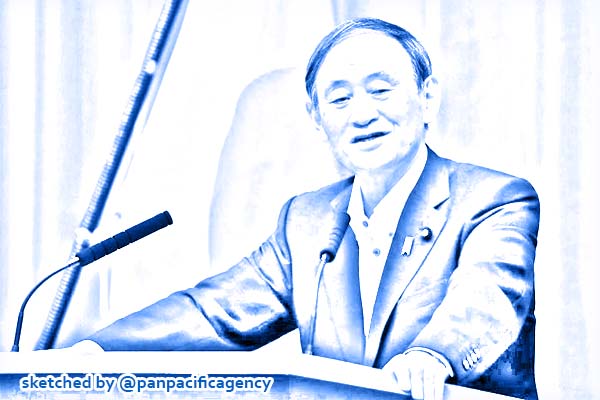Yoshihide Suga elected Japan PM as Abe era ends, forms continuity Cabinet

Yoshihide Suga. PHOTO: EPA-EFE. Sketched by the Pan Pacific Agency.
TOKYO, Sep 16, 2020, Kyodo. Yoshihide Suga was elected Japan’s prime minister by parliament on Wednesday, with the country’s first new leader in nearly eight years forming a Cabinet filled with familiar faces as he vows to stay the course set by his predecessor Shinzo Abe, Kyodo News reported.
For Suga, who became chief of the Liberal Democratic Party earlier this week, the immediate focus will be reviving the battered economy while keeping the novel coronavirus under control, with longer-term challenges including the country’s falling birthrate and a myriad of diplomatic disputes with Asian neighbors.
Suga has pledged to push forward with Abe’s policies including “Abenomics,” a mix of measures aimed at beating deflation and spurring growth in the world’s third-largest economy.
The 71-year-old farmer’s son, who unlike Abe and many other lawmakers in Japan is not the scion of a political dynasty, has hinted at the possibility of additional steps to shore up the economy.
This would come on top of a 230 trillion yen ($2.2 trillion) package the government has already set out for tackling the COVID-19 outbreak, including subsidies for beleaguered businesses and promotion of domestic tourism.
He will also take over a sweeping review of Japan’s national security policy that was initiated by Abe after plans to introduce a U.S.-developed missile defense system were scrapped due to technical issues.
Health minister Katsunobu Kato was chosen to succeed Suga as chief Cabinet secretary, a key post that serves as both a policy coordinator and the government’s top spokesman. Nobuo Kishi, Abe’s younger brother and a former senior vice foreign minister, was named defense minister in his first Cabinet post.
Kishi’s predecessor in the defense post, Taro Kono, was tapped for minister in charge of administrative reform, an area Suga has promised to focus on to reduce bureaucratic sectionalism.
Underscoring Suga’s pledge of continuity with Abe, other Cabinet members including Finance Minister Taro Aso, Foreign Minister Toshimitsu Motegi and Environment Minister Shinjiro Koizumi were retained. Of the Cabinet’s 20 members, 15 had ministerial portfolios in the previous administration.
There are only two women, Justice Minister Yoko Kamikawa, and Olympics and Paralympics minister Seiko Hashimoto.
Abe’s Cabinet resigned en masse Wednesday morning, drawing an end to the premier’s record-long tenure of seven years and eight months. He announced in late August he would step down to receive treatment for a chronic bowel disease that had left him fatigued and unsure of his ability to lead the country.
“I have spent every day putting my all into economic recovery and diplomacy to protect Japan’s interests,” Abe told reporters at the prime minister’s office. “It is my honor to have been able to work on a range of issues along with the people during this time. I want to thank everyone from the bottom of my heart.”
The Diet convened an extraordinary session in the afternoon to elect his successor, a foregone conclusion as the ruling coalition of the LDP and junior partner Komeito has a majority in both chambers. Suga received 314 votes in the 465-member House of Representatives and 142 votes in the 245-member House of Councillors.
After announcing the members of his Cabinet, Suga will be formally inaugurated in a ceremony at the Imperial Palace and hold a press conference in the evening. His tenure will last through the remainder of Abe’s term as LDP leader until September 2021.
At 71 years and nine months old, Suga will be the oldest prime minister to take office since Kiichi Miyazawa in 1991.
Aside from tackling the short-term economic damage that the coronavirus has caused by forcing people to stay home and wiping out tourism from overseas virtually overnight, Suga will be tasked with stemming the country’s falling birthrate and improving its dismal fiscal health.
The consumption tax will eventually need to be raised from the current 10 percent to cover for swelling social security costs, Suga has said, though not for the next decade or so.
On the foreign policy front, he has promised to continue working toward securing the return of Japanese nationals who were abducted by North Korea in the 1970s and 1980s, and to hold negotiations with Russia to resolve a territorial dispute to clear the way for a long-awaited postwar peace treaty.
Suga also looks to continue Abe’s push to amend the postwar Constitution by adding an explicit reference to the Self-Defense Forces to the war-renouncing Article 9.